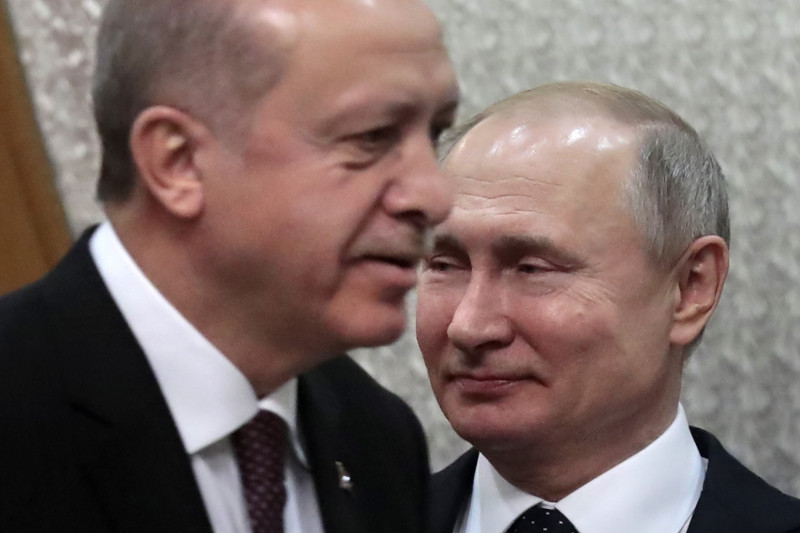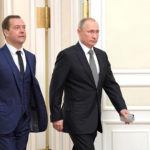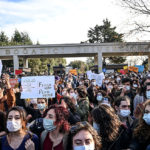The launch of a joint Turkish-Russian center to observe the cease-fire in Nagorno-Karabakh has raised questions in Turkey and among the international community regarding its effects on the Caucasus power struggle.
The joint center began operating on Jan. 30 and is tasked with supervising the cease-fire that was reached between Armenia and Azerbaijan last November following six weeks of intense fighting.
About 120 military personnel from Turkey and Russia, without unified command, will be deployed to the village of Qiyamedinli in Azerbaijan’s Aghjabadi district.
Drones will be used for the monitoring mission.
Aydin Sezer, an Ankara-based expert on Russian politics, said that opening a monitoring center outside the territory of Nagorno-Karabakh does not mean that Turkey will have political leverage in the region.
“It is a ridiculous move just for domestic consumption. Ankara unintentionally gave Kremlin a new space to maneuver within Azeri territories. Turkey is not included in the official decision-making process under the ceasefire deal,” he told Arab News.
He added that it is imperative that Ankara normalizes relations with Armenia in order to be an active player in Southern Caucasus geopolitics.
“Turkish rulers might take some steps in this direction to please the new Biden administration in Turkey,” he said.
However, other experts have said that the joint center might be a repeat of previous cooperation models between Ankara and the Kremlin, with the same challenges and difficulties attached.
“Even though it seems that the Turkish-Russian joint monitoring center will not be playing a central role in Nagorno-Karabakh, it nevertheless symbolizes the fact that Russia has finally accepted Turkey as a regional partner for the resolution of conflicts in the Caucasus,” Emre Ersen, an expert on Turkey-Russia relations from Marmara University, told Arab News.
“For many years following the collapse of the Soviet Union, Moscow had been very reluctant to welcome a more active Turkish role in the region,” he added.
However, Ersen said Russian political leverage in the Caucasus has risen considerably following the cease-fire agreement, which was demonstrated in the latest meeting between Russian president Vladimir Putin, his Azerbaijani counterpart Ilham Aliyev and Armenian Prime Minister Nikol Pashinyan in Moscow.
The joint center began operating on Jan. 30 and is tasked with supervising the cease-fire that was reached between Armenia and Azerbaijan last November following six weeks of intense fighting.
“The fact that the Turkish leaders were not present in that meeting could be viewed as a sign of Russia’s determination to maintain its status as the sole actor setting the rules of the game in the Caucasus,” he said.
But Ersen added that Turkey and Russia might also be attempting to implement their regional dialogue model in the Caucasus after launching similar mechanisms in Syria and Libya, which were aimed at limiting the role of the West in regional issues.
Ankara has long criticized OECD’s Minsk Group, led by Russia, the US and France, for failing to resolve the Nagorno-Karabakh conflict through decades of mediation.
Rauf Mammadov, resident scholar at the Middle East Institute, said that the launch of the joint center is a “limited success” for Turkey.
“Despite Moscow’s resistance, Ankara managed to establish a military presence in the region. Although the joint center is located outside Nagorno-Karabakh, Ankara has laid the ground for a more assertive future role in the geography by co-opting its historic rival Moscow,” he told Arab News.
Mammadov added that the joint center is a compromise by Russia in the face of Turkey’s persistence to gain a more active role in the post-war settlement of the region.
“By partnering with Ankara in the region, Moscow acknowledges the former’s growing influence in the South Caucasus, especially in Azerbaijan. But at the same time, by locating the center outside Nagorno-Karabakh, the Kremlin is preserving its exclusive role as a leading judge of the warring sides’ issues within Nagorno-Karabakh,” he said.
Rumors are circulating surrounding Ankara’s readiness to normalize relations with Armenia and its willingness to open border crossings. The only barrier before the border closure — for nearly three decades — was the Armenian occupation of seven Azeri regions adjacent to Nagorno-Karabakh, an issue that was resolved in the Russia-brokered ceasefire.
Mammadov, as with Sezer, said that it is crucial that Turkey normalizes relations with Armenia in order to achieve a more prominent role in the region.
“Both countries may benefit from active diplomatic and economic ties, which would subsequently decrease Armenia’s dependence on Russia,” he said.
In 2009, the then-Turkish president Abdullah Gul and his Armenian counterpart Serzh Sarkisian initiated so-called “soccer diplomacy,” by visiting matches played between their national teams, which resulted in historic protocols to re-establish diplomatic ties.
However, the novel move aimed at opening a new chapter in bilateral relations soon backfired following intense opposition among Turkish and Armenian nationalists.
Neil Hauer, an expert on Caucasus conflicts, said that Turkey has only made limited progress in its goals, since the new cease-fire monitoring center is unrelated to the tripartite agreement and provides no stipulations for Ankara to be involved in future negotiations.
“In this way, Turkey has made some progress in their regional goals — they now at least have a joint base with Russia for monitoring the cease-fire — but in the most fundamental way, they are no closer to being included in the negotiations over Karabakh and its status,” he told Arab News.
But for Russia, he added, the joint center is “certainly an achievement.”
Hauer said: “Turkey could always have opened a base in Azerbaijan by means of a bilateral agreement between Ankara and Baku, but Russia now has a military presence on both sides of the line of contact — both on the Karabakh Armenian side and on the Azeri side.
“This gives Russia even greater control over the conflict than the already dominating position they had following the entrance of 2,000 peacekeepers into Karabakh.
“The main outcome of this is that Russia now rules this conflict more than ever before.”
By: Menekse Tokyay
Source; Arab News



